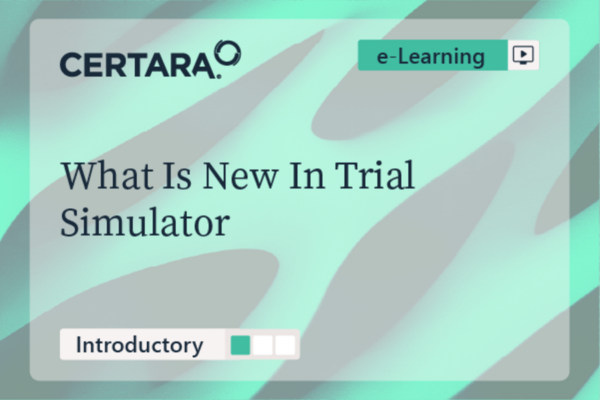
Cost - Free This complimentary course will teach you the new features, functionality and improvements available in Trial Simulator 2.3. Trial Simulation is used to optimize trial design to ensure greater success to meet trial objectives. This course is intended for users who have prior experience with Trial Simulator and who are upgrading to version 2.3. Although certain sections might help new users to better understand the aspects of trial simulation prior experience is recommended. The course explains the new features that have been added and also contains a practical component to verify knowledge. There is no need to have the software installed locally to take this short course and do the practical sections. Course Content Introduction Installation, configuration, supported OS, other 3rd party compatibility Accessing study files and simulation results from previous version PK/PD Trial Simulation Demonstration [includes an interactive section] Plotting and Analysis using R Software within Trial Simulator [includes an interactive section] Conclusions Software Used Trial Simulator 2.3 (No need to install locally) Course Length: The course provides approximately 2 hours of video instruction which includes a practical component that you can do at your own pace. It is expected to take participants about 4 hours to complete, including time to perform the tasks in Trial Simulator 2.3. Prerequisites Participants should have a good background in pharmacokinetics and pharmacodynamics modeling and simulation, and ideally, prior experience with Trial Simulator software. Instructor Christopher Mehl is a Senior Software Trainer with Certara University, and has been with Certara since 2003. His educational background is a BS in Molecular Biology from the Ohio State University, and an MS in Pharmacology from the University of Wisconsin. He has conducted over 200 training courses with Certara products such as Phoenix WinNonlin, IVIVC, NLME, PKS, and Trial Simulator. These include workshops at the US Food and Drug Administration, universities, customer sites, and courses open to the public. Read more

This is an archive of the NONMEM to NLME webinars that were presented during 2018. The goal is to demonstrate how to convert NONMEM models into Phoenix. A range of scenarios is covered ranging from PK and PKPD to categorical response and TMDD models. All sessions include a detailed discussion of the translation from NM-TRAN to PML code as well as how to setup and run NONMEM and Phoenix NLME models, finishing with a comparison of the two model results. Read more

Pre-Conference Workshop at PAGE 2026 Price: $150 (Academic $75) For academic pricing, contact info@certarauniversity.com. Be prepared to offer some evidence (such as an academic email address or a student ID) that you are eligible for the discount. Course Description This course is a unique opportunity to learn from Professor Stephen Duffull, a globally recognized pharmacometrician with more than 30 years of experience. Although he is widely known for his deep expertise in NONMEM and population PK/PD modelling, in this course, he will be teaching RsNLME, bringing the same rigor, quantitative insight, and modelling principles that have guided his work throughout his career. His ability to translate concepts across modelling platforms makes his instruction especially valuable for learners adopting RsNLME and with some prior knowledge of NONMEM. Introduction Phoenix is a data analysis software application that supports population PK and PKPD modelling amongst many other pharmacometrics approaches. For population analysis, Phoenix uses the NLME engine for which it uses the Phoenix Model Language (PML). The NLME engine can be run from a variety of sources including the Phoenix application (a graphic user interface software application) as well as from R. The R version is called RsNLME. PML code that runs in Phoenix will also run in R (and vice versa). PML models can be written in Phoenix and exported or written by the user using any text editor, much as you would do with NONMEM (often by adapting an existing library model). Scope This workshop covers (i) writing (PML) as text code and saving as an *.MDL model file (MDL = model), (ii) reading in a NONMEM readable data set into R, (iii) defining additional pre-optimization run settings (e.g. estimation method etc), (iv) fitting the model using NLME, (v) creating GOF plots and individual plots, (vi) creating VPC and pcVPC plots and (vii) simulating from the model. Item (i) will be performed using a text editor. Items (ii to vii) will be performed in R. The PML language file (*.MDL) will be compared and contrasted to the standard NONMEM control file (e.g. *.MOD or *.CTL). PML language files will be created from both a shiny app as well as by text editing existing files. A small set of example models will be considered that illustrate how the PML model file would be set up. Objectives It is anticipated that the participant will be able to edit and update existing PML file models and run these within R by the end of the workshop. Style Intermittent slide presentations interspersed with detailed description of coding elements and hands-on. About 70% of the workshop will be hands on. R-scripts to run PML and PML examples will be made available. Audience Mid-beginners to Intermediate. Some prior experience with NONMEM would be helpful, given the compare and contrast element of the some of the material, but this is not a requirement. Experience with a population approach is required. Location: The classroom will be near the PAGE conference in the Acroma Valamar Hotel, Dubrovnik – Croatia. (more details to be provided) Date and Time: Tuesday, 2 June 2026 from 09:00 to 17:00 We recommend waiting to finalize your travel plans until May 3, 2026, to confirm the course will proceed as scheduled. Requirements: Each participant must bring their own laptop and be familiar with the fundamental use of R software. Experience with a population approach is required. Some experience with NONMEM is preferred. Licenses for RsNLME will be provided. RsNLME licenses are always free for academia. Instructors Stephen Duffull is a Senior Scientific Advisor at Certara and Professor at the Universities of Otago and Queensland. He has been working in the area of pharmacometrics and PKPD for more than 30 years during which time he has been active in research, model informed drug development, leadership roles and training. Read more
Shopping Cart
Your cart is empty
